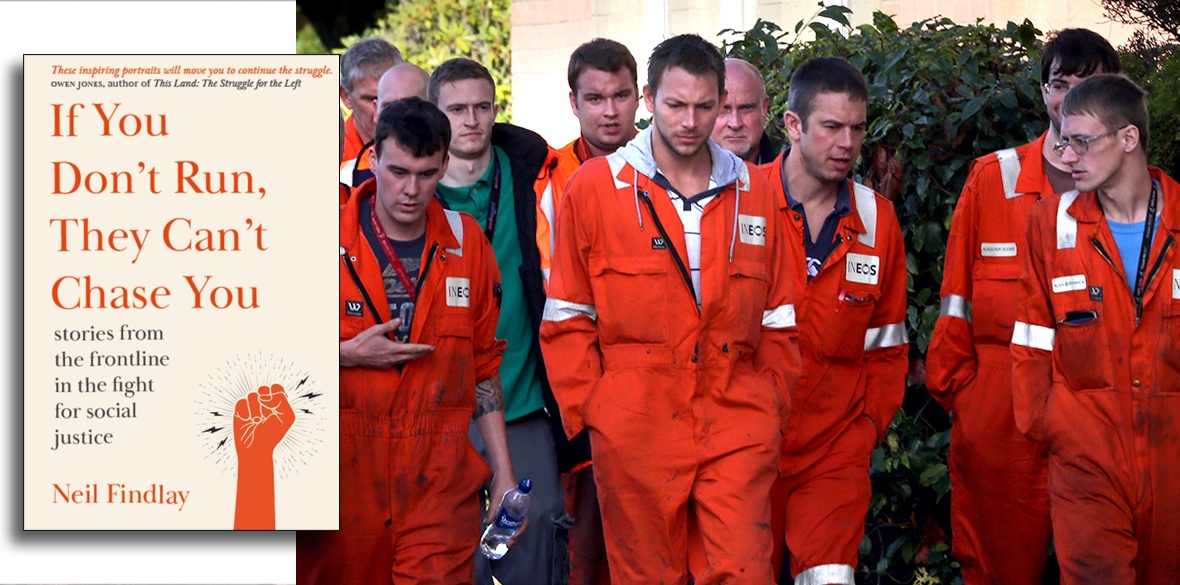This is the last article you can read this month
You can read more article this month
You can read more articles this month
Sorry your limit is up for this month
Reset on:
Please help support the Morning Star by subscribing here
If You Don’t Run, They Can’t Chase You
by Neil Findlay
Luath Press £7.99
I’VE SEARCHED every newsagent in Grangemouth, the site of Scotland’s biggest petrochemical plant, for a copy of the Morning Star, and in vain. How come?
The answer lies in Mark Lyon’s honest account of the Battle of Grangemouth, that took place between Unite and the new owners Ineos, under Jim Ratcliffe.
It is a painful but eye-opening story that comes halfway through If You Don’t Run They Can’t Chase You, a fascinating and highly readable collection of first-hand accounts “from the frontline in the fight for social justice’, as collected and compiled by the former MSP Neil Findlay.
Each is the story of a working-class life that needed to find the solidarity of collective activism to defend jobs, lives, health and dignity. They are personal snapshots that allow you to glimpse the history of industrial relations in Britain since 1945. They act as markers in a bigger picture, a sorry tale of de-industrialisation and aggressive class warfare waged by the political rightwing, the state and private business.
Some of these stories are known through personal memoires, such as Alistair Mackie’s story of the struggle to save the Scottish Daily Express by establishing workers’ ownership, The Trade Unionist and the Tycoon, or Maria Fyfe’s superbly written memoire of political apprenticeship, Singing in the Streets, and then political life, A Problem Like Maria.
This book offers such history in succinct summary, and it is rendered as it was told directly to Findlay himself. This decision works superbly: you feel that it is a privilege to listen to these remarkable men and women in their own words.
The story of collective action begins with Mackie in the 1970s, and then runs into Thatcherism: blacklisting, the miners’ strike, British Leyland, and the Liverpool Dockers strike. Some are accounts of decades of activism such as Brian Filling’s story of the anti-apartheid campaign, that interlink with other left-wing struggles. Some are ongoing, such as the campaign to expose undercover police infiltration of activist organisations through fraudulent relationships, and the campaigns for justice for the victims of Hillsborough and Grenfell.
And each is a cautionary tale, with its own lessons, and told in a calm and self-critical spirit to draw out the real lessons for labour movement.
The case of Grangemouth is the most recent strike action described, and this is a very important and disconcerting account that deserves to be known.
Previously owned by BP with a “golden share” held by the government to protect a vital national asset, Grangemouth was broken up in 2000 when Ineos bought first the chemicals plant and then the refinery, and set out to dismantle union influence in the workforce.
Wages accounted for less than 2 per cent of the turnover of the business, and the campaign of the new management to cut pension rights and shares had no cost-saving basis. Rather it was an act of pure hostility by remote management towards a loyal workforce that has persisted for two decades. The climax came on the eve of the Scottish referendum, in 2013, when Unite rep Stevie Deans was fired on a trumped-up charge. The action provoked a strike and Ineos responded by shutting the whole plant down.
The question was whether to extend the strike, or to give in to the management for the sake of jobs. Instead of protecting Scottish workers from hostile management, the SNP under Alex Salmond refused to mediate.
This passivity defused the strike and supported Ineos’s punitive terms. Ratcliffe’s gamble won, rights were sacrificed, and many skilled workers left reducing a workforce that had once been 4,500 to a mere 1,300.
Mark Lyon’s conclusion deserves attention: “There is something seriously wrong with the system. At the time there was no political intervention. We need political change, decent legislation. I’d like to see the Labour Party argue to devolve employment legislation.”
Findlay has done an outstanding job with this highly responsible and necessary work that opens up a goldmine — a series of compelling insider accounts that are windows onto a peoples’ ongoing history.
Highly recommended, and particularly to the workforce at Grangemouth.












